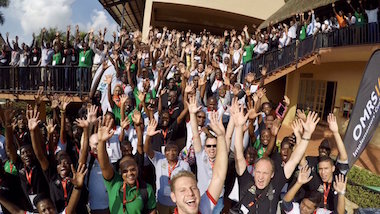 This is not going to all be about getting your books, or your socks, or even your new HD television faster. It is going to impact many industries -- including health care. And that impact has already started to happen. Zipline International, for example, is already delivering medical supplies by drone in Rwanda. They deliver directly to isolated clinics despite any intervening "challenging terrain and gaps in infrastructure." They plan to limit themselves to medical supplies, but not only in developing countries; they see rural areas in the U.S. as potential opportunities as well. Last fall they raised $25 million in Series B funding. Drones are also being considered for medical supply delivery in Guyana, Haiti, and the Philippines...
This is not going to all be about getting your books, or your socks, or even your new HD television faster. It is going to impact many industries -- including health care. And that impact has already started to happen. Zipline International, for example, is already delivering medical supplies by drone in Rwanda. They deliver directly to isolated clinics despite any intervening "challenging terrain and gaps in infrastructure." They plan to limit themselves to medical supplies, but not only in developing countries; they see rural areas in the U.S. as potential opportunities as well. Last fall they raised $25 million in Series B funding. Drones are also being considered for medical supply delivery in Guyana, Haiti, and the Philippines...
Philippines
See the following -
Open source solutions for the Philippines
THE National Telehealth Center (NTHC) has urged Filipinos to become more active members of the OpenMRS (Medical Records System) to enhance the country’s health capacity. To promote the system, the NTHC recently organized a gathering of developers and users of free and open-source software for use in health centers around the world for the sixth annual OpenMRS Implementers Meeting held at the Y.C. James Yen Center at the International Institute of Rural Reconstruction (IIRR).
- Login to post comments
OpenMRS Conference in Uganda Redefines Global Health IT Collaboration
 Hundreds of developers and health experts gathered in Uganda this past December to attend the OpenMRS Implementers conference. This event has in many ways redefined the global health IT landscape. This is the first OpenMRS conference that has been officially sponsored by the government of a nation, setting the stage for future conferences that can bring together open source developers and government officials to build national health IT solutions. Read More »
Hundreds of developers and health experts gathered in Uganda this past December to attend the OpenMRS Implementers conference. This event has in many ways redefined the global health IT landscape. This is the first OpenMRS conference that has been officially sponsored by the government of a nation, setting the stage for future conferences that can bring together open source developers and government officials to build national health IT solutions. Read More »
- Login to post comments
OpenMRS Contributor of the Month Works on Rwanda eHealth Systems
...These days, I’m working in the Rwanda Ministry of Health’s eHealth Department as an implementation lead and program manager for the Rwanda Health Information Exchange (RHIE) initiative, under a contract to Regenstrief Institute. Our project tries to improve healthcare delivery through implementation of a health information exchange that allows healthcare providers to easily save and access patient information for specific care services... Read More »
- Login to post comments
OpenStreetMap Response To Typhoon Haiyan / Yolanda
The Typhoon Haiyan / Yolanda in Philippines is the worst ever registered. The Humanitarian OpenSteetMap Team (HOT) has activated to provide geographic base data in areas affected by typhoon Yolanda/Haiyan in the Philippines. Currently we are supporting the active OpenStreetMap Philippines community. [...] Read More »
- Login to post comments
Philippines National Telehealth Center Leverages Innovative Open Solutions to Provide Equitable Access to Quality Healthcare
 OpenGov had the opportunity to speak to Dr. Portia Grace Fernandez-Marcelo, Director of the UP (University of Philippines) Manila-National Telehealth Center (NTHC) about using ICT to provide equitable access to quality healthcare for all, specially in isolated and disadvantaged communities. NTHC is one of the pioneers in the Philippines developing cost-effective ICT tools and innovations for improving healthcare and deploying solutions in communities where they are required most urgently...
OpenGov had the opportunity to speak to Dr. Portia Grace Fernandez-Marcelo, Director of the UP (University of Philippines) Manila-National Telehealth Center (NTHC) about using ICT to provide equitable access to quality healthcare for all, specially in isolated and disadvantaged communities. NTHC is one of the pioneers in the Philippines developing cost-effective ICT tools and innovations for improving healthcare and deploying solutions in communities where they are required most urgently...
- Login to post comments
Rise of Drones for Medical Supply Delivery
- Login to post comments
The Disaster Response Innovation Fund Is Open for Applications
 Since the inception of GSMA’s Disaster Response programme in 2012, we have worked with our GSMA members, humanitarian partners and the wider private and humanitarian sectors to drive the creation and adoption of coordinated, impactful solutions and practices that leverage the ubiquity of the mobile technology. Since 2015 we have done this under the umbrella of the Humanitarian Connectivity Charter, a global initiative which now has over 115 Mobile Network Operator (MNO) signatories across 78 countries...
Since the inception of GSMA’s Disaster Response programme in 2012, we have worked with our GSMA members, humanitarian partners and the wider private and humanitarian sectors to drive the creation and adoption of coordinated, impactful solutions and practices that leverage the ubiquity of the mobile technology. Since 2015 we have done this under the umbrella of the Humanitarian Connectivity Charter, a global initiative which now has over 115 Mobile Network Operator (MNO) signatories across 78 countries...
- Login to post comments
Tracking An Ebola Outbreak In A City Without Maps
If you Google Map Guéckédou, the Guinean city smack dab in the Ebola virus's deadly domain right now, you'd see just an abstract blotch of beige and yellow. Zoom all the way in on satellite view, and you can barely make out the outlines of buildings.
- Login to post comments
Weekly: Typhoon Yolanda Relief, Hackathons And Software Releases
This week, we recognise the efforts of the team at Volontaires internationaux en soutien aux opérations virtuelles (VISOV), who are crowdsourcing images of destruction and aid deployment in the wake of the Typhoon Yolanda in Philippines. This deployment, much like all other efforts being ran out there, will go a long way in helping to alleviate the suffering of the Filipino people. Read More »
- Login to post comments
We’re Not No. 1! We’re Not No. 1!
...a major new ranking of livability in 132 countries puts the United States in a sobering 16th place. We underperform because our economic and military strengths don’t translate into well-being for the average citizen. In the Social Progress Index, the United States excels in access to advanced education but ranks 70th in health, 69th in ecosystem sustainability, 39th in basic education, 34th in access to water and sanitation and 31st in personal safety...
- Login to post comments
When the United Nations Calls, MicroMappers Acts
 Open source and crowdsourcing—uttering these words at a meeting of the United Nations before the year 2010 would have made you persona non grata. In fact, the fastest way to discredit yourself at any humanitarian meeting just five years ago was to suggest the use of open source software and crowdsourcing in disaster response. Then, a tragic earthquake occured in Haiti in 2010, and OpenStreetMap and Ushahidi were deployed in the aftermath. Their use demonstrated the potential of free and open source crowdsourcing platforms in humanitarian contexts. Then, Typhoon Ruby in the Philippines occured five years later. What technology was used?...
Open source and crowdsourcing—uttering these words at a meeting of the United Nations before the year 2010 would have made you persona non grata. In fact, the fastest way to discredit yourself at any humanitarian meeting just five years ago was to suggest the use of open source software and crowdsourcing in disaster response. Then, a tragic earthquake occured in Haiti in 2010, and OpenStreetMap and Ushahidi were deployed in the aftermath. Their use demonstrated the potential of free and open source crowdsourcing platforms in humanitarian contexts. Then, Typhoon Ruby in the Philippines occured five years later. What technology was used?...
- Login to post comments
Why Southeast Asia Should Embrace the Open Source Movement
In the last five years, Southeast Asia has grown to become a big consumer of modern web technologies to create digital products and services. More and more tech companies from the US are opening offices here and many with the goal to build engineering and development offices for their regional needs.
- Login to post comments
Wireless Access for Health Project and Open Source HIS to Expand to All Tarlac Health Clinics in the Philippines
Tarlac to Become the First Philippine Province to Use 3G Technology and a Modern [Open Source] Health Information System to Enable More Responsive Health Care for an Entire Province
Read More »
- Login to post comments
‘Mobile Midwife’ Taps Technology To Improve Health Care
Fermina Flores, 60, has been working as a midwife in the municipality of Gerona, Tarlac for the past 34 years, covering four barangays (villages) with a combined population of around 8,000. [...] And she does it all with the help of her high-tech 3G wireless data network-capable tablet computer that can record patients’ health information... Read More »
- Login to post comments
OpenMRS 2012 Implementers Meeting
The annual OpenMRS Implementers Meeting began in 2006 as a way to bring members of the community together during a dedicated amount of time to collaborate, share implementation experiences, and find ways to improve OpenMRS.
Who should attend Read More »
- Login to post comments